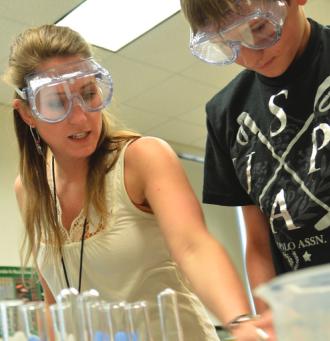Team seeks to develop ExpeRT-Earth program model
Elena Hines
College of Arts and Sciences staff writer
An Experiencing Research for Teaching Earth Science (ExpeRT-Earth) grant planning workshop will be held Thursday, May 5 from 8 a.m. to 1 p.m.
Funded through a Western Michigan University College of Arts and Sciences Interdisciplinary Research Award, the workshop will help participants develop a collaborative vision for the ExpeRT-Earth program, and organizers’ goal is to leave with a draft program model that will be competitive for National Science Foundation funding.
WMU developed the ExpeRTS (Experiencing Research for Teaching Science) program following receipt of a $1 million grant from the Howard Hughes Medical Institute in 2010. ExpeRTS created cohorts of prospective middle and high school teachers who gained first-hand experience in scientific research and translating that research into classroom lessons.
However, funding for the program ended in 2015, and the group now seeks to develop ExpeRT-Earth, a program that builds on the success of the ExpeRTS program, but focuses specifically on earth, environmental and climate science. In addition, the reach of the program would expand to WMU’s feeder community colleges—primarily Kalamazoo Valley Community College, Kellogg Community College and Lake Michigan College.
The original program had four cohorts of 12 students each; while some are still at WMU, many have graduated and gone on to teaching positions.
“From the feedback we’re receiving, they feel really well prepared for the teaching program,” said Dr. Heather Petcovic, an associate professor of earth science education who holds a joint appointment in the Department of Geosciences and the Mallinson Institute for Science Education and who is one of the recipients of the Interdisciplinary Research Award.
Extensive data in the form of surveys, classroom observations and interviews have been collected from the participating students. What students perceived as the main strengths of the program, as well as where they thought improvements could be made, will be shared at the May workshop.
Teaching has a very high attrition rate in the first five years, Petcovic noted, saying they wanted to do “anything we can do to help students get a teaching job and get over that hurdle.”
The project team includes Petcovic, Steve Bertman, Todd Ellis, and Cathy Northcutt. The original program was under the direction of Sue Stapleton, who has been instrumental in planning and data collection as the group seeks to move forward.


